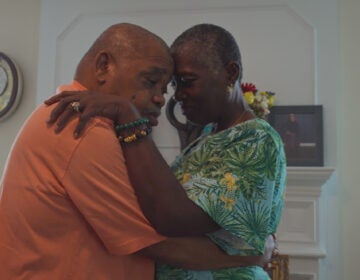Why do some patients cry after anesthesia?
Listen 5:45
Dr. James Heitz, seen here with nurse Esmihan Almontaser, says crying after anesthesia occurs frequently enough that 'we should be aware of it as providers' even though it's not frequently documented in major anesthesiology textbooks (Karen Shakerdge/for WHYY)
This story is from The Pulse, a weekly health and science podcast.
Subscribe on Apple Podcasts, Spotify or wherever you get your podcasts.
The more patients I talked to, the more crying stories I heard.
Questions beget questions. That’s certainly true for reporters; a lot of times when we’re working on one story, we stumble on another issue that’s really worth looking in to. That happened to me recently when I did a piece about how surgeons communicate the results of operations to patients.
For this story, I interviewed several people who had had surgery recently, and we talked about the moment when they first woke up after their procedure. I kept hearing the same thing, over and over.
“It’s going to be embarrassing to say, but I woke up crying,” admitted Zakiya Gibbons, who was finishing up college at the time. She said she regained consciousness after a major surgery and was suddenly really worried about a group project she had to finish for one of her classes.
“I have to type up this thing, they are going to be so mad at me, and the funny thing was I was reacting, disproportionate to how I actually felt, because, in my head I knew they’ll be understanding, but my body was reacting,” she recalled “And the other time I had surgery, I also cried, but for no reason, I’m just sad, I was just boo-hooing.”
The more patients I talked to, the more crying stories I heard. Philadelphian Sarah Tebbe said she was weeping in the recovery room.
“A nurse came by and said, ‘oh, honey what is wrong?’ and I said ‘my dog died.’ And she said, ‘oh sugar I’m sorry, when did your dog die?’ And I said ‘eight years ago,’ and actually it had been five years that the dog had died.”
I heard so many stories like this, crying after anesthesia was beginning to sound like a thing.
I asked around a bit, and found out that nurses who work in recovery rooms are very familiar with this. “As patients are coming out of anesthesia, I notice sometimes tears rolling down their cheeks to outward bawling,” said Esmihan Almontaser, a nurse educator in the post op care unit at Jefferson University Hospital.
Research on the topic came up empty though, I couldn’t find any studies or science on this, and Anesthesiologist James Heitz finally told me I was searching in vain.
Subscribe to The Pulse
“If you look at any of the major textbooks on anesthesiology, and there are three of them, you won’t even find crying in the index, it’s not even mentioned. But it’s something that patients talk about,” he explained.
Heitz teaches at Thomas Jefferson University, and has just completed a book about post-anesthesia care. One whole chapter is dedicated to crying.
“It occurs frequently enough that we should be aware of it as providers, it may generate some interest among the medical community, and if you google crying after surgery you’ll get pages and pages of information, and it’s all generated by patients.”
What Heitz is talking about is called “pathological” crying, where patients are not in pain, they are not upset, sad or scared, but they are weeping for no apparent reason.
Why this happens is unclear. Heitz says anesthesia remains a mystery on many levels, for example, it is not yet understood how exactly the process works, and there is no serious research on what aspect of going under makes some people cry when they wake up.
The drugs used to sedate patients seem to play a role. “There is a medication called Sevoflurane, which is a gas that we use commonly to keep patients asleep there’s some increased incidence of crying when that medication is used,” said Heitz.
But he suspects many factors could be involved; the stress of surgery, combined with medications and feeling slightly disoriented. He says for children, crying after anesthesia is very common – it happens in about 30 to 40 percent of the cases. For adults, the numbers are much lower – he estimates them to be around three percent – but crying is not even something that gets written down in the patient notes.
Nurse Esmihan Almontaser says no matter what the cause, it’s important to reassure her patients. “We hold their hands, touch their shoulder, wipe their tears, and just listen. Sometimes the best comfort we can give is just to stay silent and listen to them cry and just be there for them.”
Heitz hopes that documenting this phenomenon could inspire some more research on the causes. Understanding why people cry after anesthesia could help patients who suffer with pathological crying because of illnesses like Parkinson’s, or because they’ve had a stroke.
WHYY is your source for fact-based, in-depth journalism and information. As a nonprofit organization, we rely on financial support from readers like you. Please give today.







